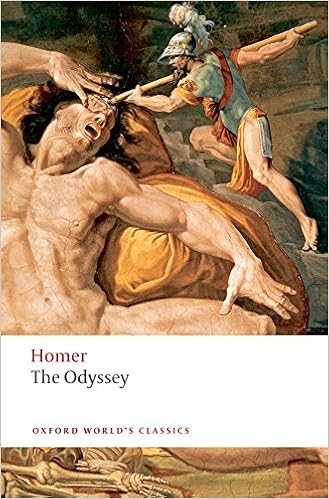Jews Praying In The Synagogue on the Day of Atonement by Maurycy Gottlieb (Tel Aviv Museum of Art) The Israel Book Review has been edited by Stephen Darori since 1985. It actively promotes English Literacy in Israel .#israelbookreview is sponsored by Foundations including the Darori Foundation and Israeli Government Ministries and has won many accolades . Email contact: israelbookreview@gmail.com Office Address: Israel Book Review ,Rechov Chana Senesh 16 Suite 2, Bat Yam 5930838 Israel
Thursday, June 28, 2018
The Odyssey (Oxford World's Classics) Reprint Edition by Homer (Author), Walter Shewring (Translator), G. S. Kirk (Introduction) (Oxford University Books)
Before I begin, a disclaimer. This review is not written to help you decide whether to read the Iliad. It is to help you decide which translation of the Iliad to choose. In short: In 2015, this is the best translation to get. Get it in paper, not Kindle.
Peter Green states in the introduction that he is following in the footsteps of Lattimore, to preserve as much of the poem in Greek--wording, sentence structure, meter, and so on--in English, but to also make it declaimable. It is a translation to be read aloud. Thus, it is also a challenge to Fagles's translation, among whose virtues is how well it works as an audiobook.
To review, there are several major verse modern translations of the Iliad. Lattimore's is closest to the original Greek, and for undergraduate work can substitute for the original well enough. There is the Fagles translation, in modern free verse, is wonderful to read aloud. The Fagles Odyssey was on Selected Shorts once, and for a long time after I insisted that there was no other worthwhile contemporary translation of Homer. I swore by it. Lombardo's translation is pretty common in colleges because of the price and the slangy presentation. Then there is Fitzgerald, which some swear by, but Fitzgerald's translation is loose with the Greek and mannered and fey in its English. It even translates Odysseus as "Ulysses," a sure sign that fidelity to the Greek is not worth the translator's trouble. I am missing some others, I'm sure.
So let us begin at the beginning. In the Greek, the Iliad has "μῆνιν ἄειδε θεὰ Πηληϊάδεω Ἀχιλῆος" Quite literally, "Rage! sing goddess of the son of Peleus Achilles." μῆνιν means, more or less, the anger that engenders revenge, rage, wrath, anger are all ok to some degree. (It's complicated, an entire scholarly treatise is written on the meaning of the word.) Green gives, "Wrath, goddess, sing of Achilles Peleus's son's [/ wrath]." Fagles gives "Rage--Goddess sing the rage of Peleus's son Achilles." Lattimore gives "Sing, goddess, the anger of Peleus' son Achilleus." Green and Fagles are right to put the first word first. This is poetry, after all, the order of the words matter, the first especially. The first word is the theme of the poem, the way it is directed first against Agamemnon, then toward the Trojans, and then tempered for a common moment of humanity, is the internal trajectory of the whole epic. Wrath might be best of all, since it conveys that it is anger in a sense that is unfamiliar to modern readers.
Once, in my second year of taking Greek, I was told that there was no use of literal translations. Take it far enough, and you wind up with a textbook on how to read the book in the original Greek. Make it into readable English, and you wind up with a host of compromises where thousands of close translations might do. Go far enough you wind up with Girardoux's "The Trojan War Will Not Take Place," worthwhile on its own, but not really a "translation." That professor preferred Fitzgerald, but easy for her to do, she could read anything in Greek without any help. For us mortals with mostly forgotten Greek, or no Greek at all, closeness to the original in a translation should be treasured.
In the end, translating Homer is a game of compromises, How much of the strangeness of 2500 year old lines and 3200 year old motivations do you keep? Dactylic hexameter calls for lines much longer than any form of English verse, so shorter lines or not? And so on. For me, Fagles is as far to compromise with how English verse should go as I am willing to accept. For what it's worth, Lattimore's English verse is better than his critics complain of.
Starting from no knowledge of Greek, I'd choose Green. Over Lattimore because it's friendlier for the beginner and not worse as far as I can tell for a serious third reading. Over Fagles because the true-to-the-Greek line lengths convey the way the poem drives itself forward better in Green's line by line than in Fagles's free verse.
Also. The introduction includes a plot summary of the whole Trojan War, of which the Iliad only covers a small portion. I have never seen such a succinct and complete synopsis before. There is also a synopsis of the poem keyed to the poem in the back matter to help find your place, an enlightening glossary of names and concepts to help you through your first read, and footnotes to inform the reader of context that has since been lost.
Word to the wise re: Kindles. These are long verse lines. To get complete lines on a Kindle screen, you need a Kindle that allows text to display in landscape mode.Even then, complete lines only work in a very small font size. Get this in hardback for now. The hardback is stitched and bound to keep, so it is worth your money.
Subscribe to:
Post Comments (Atom)

No comments:
Post a Comment